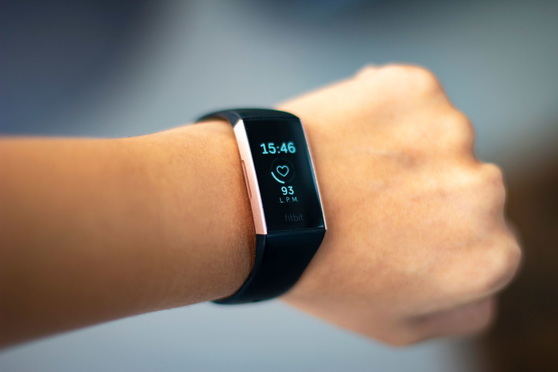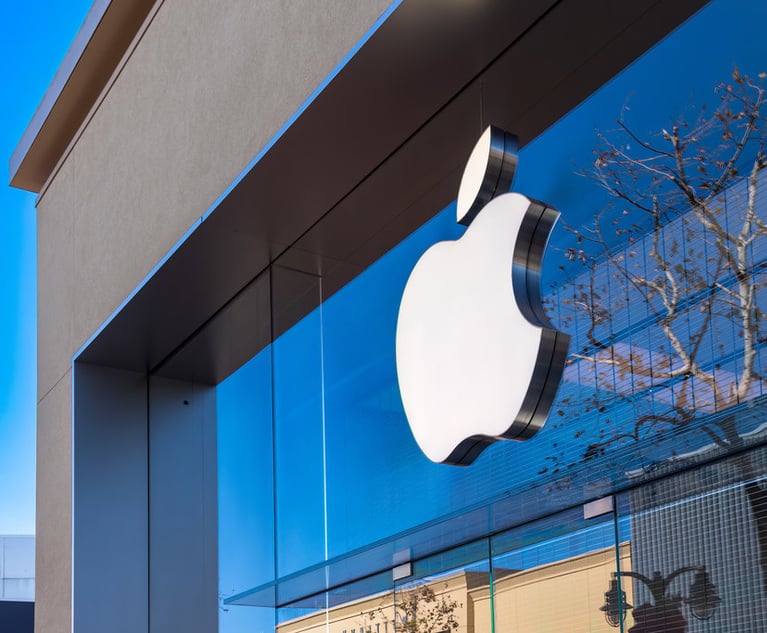Why the Feds Deserved to Fail in Fitbit Trade Secrets Case
'We have always believed that our client was innocent and that this case never should have been brought,' said Walter Brown Jr., who heads Orrick's white collar practice
February 04, 2020 at 12:34 AM
7 minute read
The original version of this story was published on Litigation Daily
 Woman monitoring her heart beat with a fitbit charge 3 activity tracker.
Woman monitoring her heart beat with a fitbit charge 3 activity tracker.
"This is a criminal court. What are we all doing here?"
That's what Orrick, Herrington & Sutcliffe partner Randy Luskey asked a federal jury in San Jose, California on Friday—and it was a darn good question.
Because for the feds to bring criminal charges against his client Katherine Mogal, who was accused of stealing trade secrets when she left her job at now-defunct consumer electronics startup Jawbone to join Fitbit, was an odd—and ill-conceived—move.
The jury agreed. After less than two hours of deliberations, they acquitted Mogal on Monday of all counts.
"We have always believed that our client was innocent and that this case never should have been brought," Luskey's co-counsel Walter Brown Jr., who heads Orrick's white collar practice, told me. Orrick partner Melinda Haag and Miranda Kane of Kane+Kimball were also on the trial team.
 Of course, there's nothing inappropriate about federal prosecutors going after people for stealing trade secrets. For example, the U.S. Attorney's Office for the Northern District of California last year charged engineer Anthony Levandowski, a key figure in the Waymo/Uber battle over autonomous driving technology, with 33 counts of stealing or trying to steal Google's trade secrets.
Of course, there's nothing inappropriate about federal prosecutors going after people for stealing trade secrets. For example, the U.S. Attorney's Office for the Northern District of California last year charged engineer Anthony Levandowski, a key figure in the Waymo/Uber battle over autonomous driving technology, with 33 counts of stealing or trying to steal Google's trade secrets.
Or take the office's cases against two Chinese-born engineers who'd worked for Apple's self-driving car unit and allegedly stole troves of schematic drawings and other materials. Both were separately arrested right before getting on planes back to China—where extradition would almost certainly have been difficult.
But what's so bizarre about the office's case against Mogal is that Jawbone had already attempted—and failed—to bring similar allegations of trade secret theft before the U.S. International Trade Commission.
After a two-week trial, an ITC administrative law judge in 2016 sided squarely with Fitbit, finding that the company did not misappropriate any of Jawbone's trade secrets.
Jawbone also pursued trade secret claims against Fitbit in San Francisco Superior Court—litigation that fizzled out in early 2018 as Jawbone went out of business.
Why after such nothingburger civil results would prosecutors in Northern California jump in with a criminal case?
In court papers, the Orrick team wrote that "Four months after this resounding defeat in the ITC Action, on February 7, 2017, Jawbone's outside counsel made a presentation to the United States Attorney's Office for the Northern District of California…advocating for a criminal prosecution. Approximately four months later, on June 29, 2017, the USAO began presenting witness testimony to a grand jury."
According to court records, Jawbone's prior counsel includes Skadden, Arps, Slate, Meagher & Flom; Susman Godfrey and Venable. Skadden partner Lance Etcheverry did not respond to a request for comment.
The feds wound up individually charging six former Jawbone employees who jumped to Fitbit at different times—an audio engineer, an accounting manager, a mechanical engineer, a user researcher, a product manager, and Mogal, who was "director of market and customer experience insights."
The six are not alleged to have conspired to steal trade secrets together, and all are represented by separate counsel. Prosecutors opted to try Mogal's case first—an indication that they thought it was their strongest.
The case against her revolved around her use of a cloud service called CrashPlan to back up her computer files automatically. It was something she'd set up on her own after her husband had a catastrophic computer crash and lost months of work, she said.
After Mogal left Jawbone on March 17, 2015, the feds said she hid the existence of her CrashPlan from her former employer, despite being given multiple opportunities to identify devices and accounts that might contain Jawbone documents. And the government told the grand jury that this proved Mogal had intentionally stolen the files.
Not true, the Orrick team responded. "The testimony that Ms. Mogal repeatedly hid her CrashPlan backup from Jawbone was false," they wrote in a motion to dismiss. "The government should have known it was false. And there was no evidence to support a finding that she intentionally stole documents from Jawbone without the false testimony."
However, U.S. District Judge Beth Labson Freeman declined to dismiss the case, writing that "although the [grand jury] testimony was false, the court cannot find that the government should have known that."
Prosecutors focused on six documents in Mogal's possession that allegedly contained trade secrets—assorted surveys of Jawbone users' backgrounds, reasons for purchasing fitness trackers, desired features, interest in health and fitness and motivation.
One problem: The government had no evidence that Mogal ever accessed a single document in her CrashPlan after leaving Jawbone or downloaded any of the alleged trade secrets from her CrashPlan to her computer at Fitbit.
In closing arguments, Luskey hammered the flaws in the government's case. Mogal simply "forgot to delete her subscription to CrashPlan when she walked away from Jawbone," he said, according to a transcript of the proceedings. "She set up a CrashPlan after her husband Josh's computer crashed in November of 2014 and she never once thought about it. She never once logged into it."
"The elements of this crime require the government to not just prove that Katy possessed these documents when she left Jawbone. We all agree with that," he continued. But the government also had to show intent.
"The key takeaway on intent is that none of these six user studies were ever shared with Fitbit," Luskey said. "The best evidence of Katy having no intent to use the documents is that she didn't actually use them."
"What was stopping her?" he continued. "If she had this master plan, if she had this intent, what was stopping her? Right? She would have got right to Fitbit and said 'Guys, you're not going to believe what I got away with. I got the 'up segmentation' study from 2013. It's two years old now, and it talks about how Jawbone segments that market.
"Yes, I realize that they're on the verge of bankruptcy and their products aren't selling and Fitbit is number one in the wearable industry and best in class and on the verge of going public, but you're not going to believe what I got away with. Everyone gather around. Let's injure Jawbone with this document."
Luskey added, "That's the government's theory."
See also: Former Jawbone Employee Wins Not Guilty Verdict in Federal Trade Secrets Trial
We hope you enjoyed this excerpt from Litigation Daily, the exclusive source for sharp commentary on mega court battles, winning strategies and the issues that obsess elite litigators. Click here to subscribe.
This content has been archived. It is available through our partners, LexisNexis® and Bloomberg Law.
To view this content, please continue to their sites.
Not a Lexis Subscriber?
Subscribe Now
Not a Bloomberg Law Subscriber?
Subscribe Now
NOT FOR REPRINT
© 2025 ALM Global, LLC, All Rights Reserved. Request academic re-use from www.copyright.com. All other uses, submit a request to [email protected]. For more information visit Asset & Logo Licensing.
You Might Like
View All
White & Case KOs Claims Against Voltage LLC in Solar Companies' Trade Dispute


'A Never-Ending Nightmare': Apple Sued for Alleged Failure to Protect Child Sexual Abuse Survivors

'The Hubris of Big Tech': Apple Hit With California Labor Lawsuit for Alleged Free Speech, Privacy Violations
Law Firms Mentioned
Trending Stories
- 1Chief Judge Joins Panel Exploring Causes for Public's Eroding Faith in NY Legal System
- 2Pogo Stick Maker Wants Financing Company to Pay $20M After Bailing Out Client
- 3Goldman Sachs Secures Dismissal of Celebrity Manager's Lawsuit Over Failed Deal
- 4Trump Moves to Withdraw Applications to Halt Now-Completed Sentencing
- 5Trump's RTO Mandate May Have Some Gov't Lawyers Polishing Their Resumes
Who Got The Work
J. Brugh Lower of Gibbons has entered an appearance for industrial equipment supplier Devco Corporation in a pending trademark infringement lawsuit. The suit, accusing the defendant of selling knock-off Graco products, was filed Dec. 18 in New Jersey District Court by Rivkin Radler on behalf of Graco Inc. and Graco Minnesota. The case, assigned to U.S. District Judge Zahid N. Quraishi, is 3:24-cv-11294, Graco Inc. et al v. Devco Corporation.
Who Got The Work
Rebecca Maller-Stein and Kent A. Yalowitz of Arnold & Porter Kaye Scholer have entered their appearances for Hanaco Venture Capital and its executives, Lior Prosor and David Frankel, in a pending securities lawsuit. The action, filed on Dec. 24 in New York Southern District Court by Zell, Aron & Co. on behalf of Goldeneye Advisors, accuses the defendants of negligently and fraudulently managing the plaintiff's $1 million investment. The case, assigned to U.S. District Judge Vernon S. Broderick, is 1:24-cv-09918, Goldeneye Advisors, LLC v. Hanaco Venture Capital, Ltd. et al.
Who Got The Work
Attorneys from A&O Shearman has stepped in as defense counsel for Toronto-Dominion Bank and other defendants in a pending securities class action. The suit, filed Dec. 11 in New York Southern District Court by Bleichmar Fonti & Auld, accuses the defendants of concealing the bank's 'pervasive' deficiencies in regards to its compliance with the Bank Secrecy Act and the quality of its anti-money laundering controls. The case, assigned to U.S. District Judge Arun Subramanian, is 1:24-cv-09445, Gonzalez v. The Toronto-Dominion Bank et al.
Who Got The Work
Crown Castle International, a Pennsylvania company providing shared communications infrastructure, has turned to Luke D. Wolf of Gordon Rees Scully Mansukhani to fend off a pending breach-of-contract lawsuit. The court action, filed Nov. 25 in Michigan Eastern District Court by Hooper Hathaway PC on behalf of The Town Residences LLC, accuses Crown Castle of failing to transfer approximately $30,000 in utility payments from T-Mobile in breach of a roof-top lease and assignment agreement. The case, assigned to U.S. District Judge Susan K. Declercq, is 2:24-cv-13131, The Town Residences LLC v. T-Mobile US, Inc. et al.
Who Got The Work
Wilfred P. Coronato and Daniel M. Schwartz of McCarter & English have stepped in as defense counsel to Electrolux Home Products Inc. in a pending product liability lawsuit. The court action, filed Nov. 26 in New York Eastern District Court by Poulos Lopiccolo PC and Nagel Rice LLP on behalf of David Stern, alleges that the defendant's refrigerators’ drawers and shelving repeatedly break and fall apart within months after purchase. The case, assigned to U.S. District Judge Joan M. Azrack, is 2:24-cv-08204, Stern v. Electrolux Home Products, Inc.
Featured Firms
Law Offices of Gary Martin Hays & Associates, P.C.
(470) 294-1674
Law Offices of Mark E. Salomone
(857) 444-6468
Smith & Hassler
(713) 739-1250






